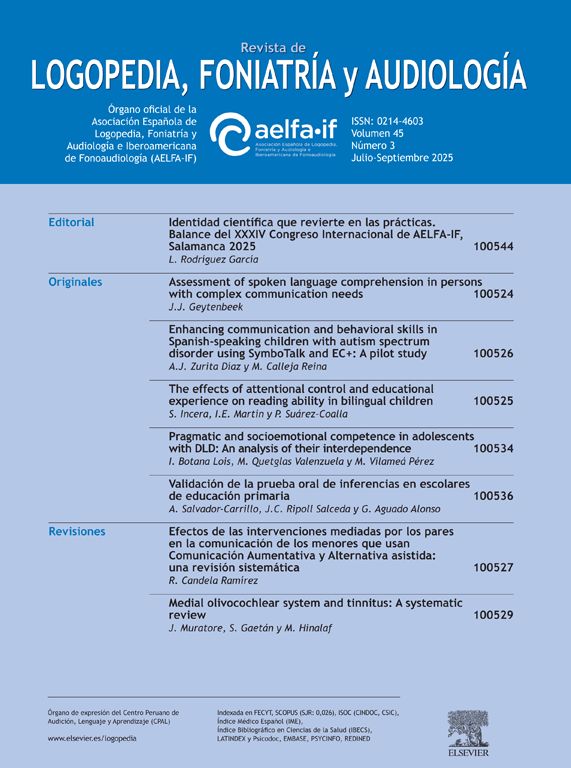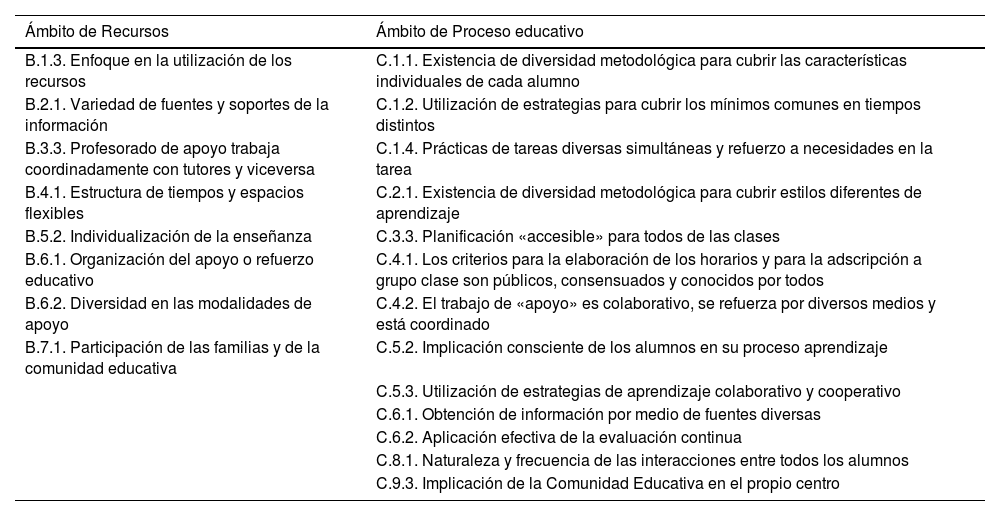Estudios previos muestran resultados académicos inferiores en escolares con trastorno del desarrollo del lenguaje (TDL) y/o dificultades de lectura (DL). El objetivo del presente trabajo es evaluar si algunas de las medidas propuestas por la escuela inclusiva para enriquecer los procesos de enseñanza-aprendizaje ejercen un efecto positivo sobre las calificaciones de escolares con TDL o DL. Se espera que las medidas de educación inclusiva que fomentan las habilidades comunicativas individualizadas ejerzan un efecto compensatorio en el alumnado con dificultades.
MétodoSe recogieron los historiales académicos oficiales de 103 estudiantes (26 con TDL, 36 con DL y 41 con desarrollo típico [DT]) escolarizados en 10 centros diferentes de las Islas Baleares. Los indicadores de escuela inclusiva fueron evaluados con el cuestionario ACADI.
ResultadosNo se encontró una correlación significativa entre las calificaciones oficiales y las puntuaciones de inclusividad para los grupos DT y TDL, aunque tres indicadores de inclusividad sí mostraron correlaciones con los resultados académicos en el grupo DL. El ANOVA (Grupo × Inclusividad) sobre la calificación media de primaria reveló resultados significativos del factor Grupo y una tendencia en el factor Inclusividad, siendo la interacción entre ambos no significativa. La frecuencia de repetición de curso fue similar entre los centros con indicadores de alta o baja inclusividad y superior en el grupo TDL con respecto a los grupos DT y DL.
Discusión y conclusionesSe constatan peores resultados académicos en los grupos TDL y DL. Las medidas de inclusión parecen compensar parcialmente al alumnado con DL, mientras que no se encontró esta compensación para el grupo TDL. Por lo tanto, es necesario continuar buscando medidas desde la escuela inclusiva para compensar las dificultades de aprendizaje del alumnado con TDL.
Previous studies have shown lower academic results in school children with Developmental Language Disorder (DLD) and/or reading difficulties (RD). This paper aims to evaluate whether some of the measures proposed by the inclusive school to enrich the teaching-learning processes have a positive effect on the grades of school children with DLD or RD. Inclusive education measures that foster individualized communication skills are expected to exert a compensatory effect on pupils with difficulties.
MethodThe official academic history of 103 students (26 with DLD, 36 with RD, and 41 with typical development; TD) attending 10 schools from Balearic Islands were collected. Inclusive school indicators were evaluated with ACADI's questionnaire.
ResultsNo significative correlations were found between official grades and school inclusivity scores for the DLD and TD groups, while three indicators of inclusivity showed correlations with the academic results in the RD group. The ANOVA (Group x Inclusivity) on the mean grade of the primary school revealed significant results of the Group factor, a tendency in the Inclusivity factor, but the interaction was non-significant. Grade retention frequency was similar between centers with indicators of high or low inclusivity, and higher in the DLD group compared to the RD and TD groups.
Discussion and conclusionsWorse academic results were found in the DLD and RD groups. Inclusion measures appear to partially compensate school children with RD, but not the DLD group. In conclusion, inclusive schools must continue looking for measures to compensate for the learning difficulties of students with DLD.











